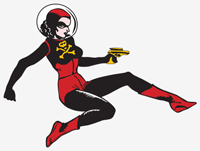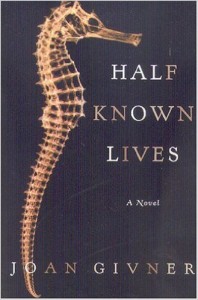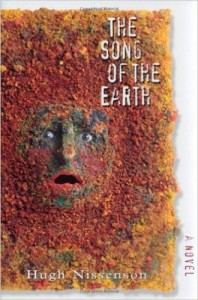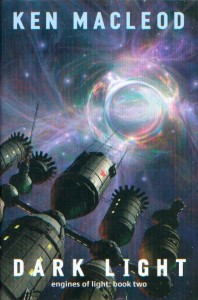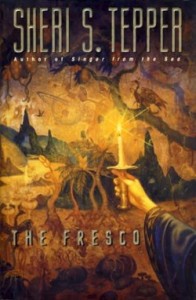In addition to selecting the winner, each jury chooses an Honor List (previously called a “Short List”). The Honor List is a strong part of the award’s identity and is used by many professors as a guide to creating syllabi and by many readers as a recommended reading list.
Honor List
The 2001 jury chose 4 works for the Honor List
I’m just as impressed as all get-out. Beautifully written, paced with a breezy confidence that takes my breath away, this book is about maternity, motherhood in many forms, without suggesting that it’s just a female matter. Questions are raised about the course of women’s lives in the absence of blood-children, but also about the lives of women raising their own kids. The apparently inescapable centrality of reproduction (or its lack) to the lives of women is tackled head-on in a very imaginative way. On the downside, the SF plot-pivot is very scantily envisioned and realized, more of a maguffin than a serious event, and it leads to nothing beyond the personal for the women involved (although the male surrogate mom manages to turn everything to his advantage in a way that women seldom seem to be able or willing to do). I wanted less sure-handed writing and characterization, and more exploration — which is not usual with me at all. Watch this author. –Suzy McKee Charnas Half Known Lives shows people at their best and at their worst–brave, innovative, and adventurous, and at the same time manipulative, secretive, selfish, and destructive. The characters are brought forward by Givner in their interactions, but ultimately recede frustratisngly into the mist, elusive and unknowable. Pregnancy is inflicted on a male politician whose views concerning women have always been . . . half-baked. All of the women involved in this scheme have their own reasons for participating, some of which are not revealed for years past the birth of the child. This book is intricately woven, and, ultimately, the man who went through the pregnancy is the character who is most changed. –Kathleen Ann Goonan Half Known Lives is arguably the book with the most complex women depicted in any of this honor list. Ostensibly a recounting of the conspiracy to kidnap and impregnate a male-chauvinist, anti-abortionist lawyer and his subsequent confinement by a coterie of feminists it works better as an exploration of the sequelae left on all by this outrageous action. It isn’t often that heroines, let alone heroes, are depicted warts and all. Givner refreshingly, fearlessly, paints her characters in living colour. They are not uniformly static “black hats” or “white hats”, rather they are complex emotional human beings who undergo changes in their lives. In other words villains can and do turn into a semblance of heroines or heroes and even the best of us have clay feet. –Peter Halasz I’m really not sure what to make of this book. It’s exquisitely written but it felt emotionally barren to me – but that may be the point. I’m sure Joan Givner finds it tiresome to be compared to Margaret Atwood, but it struck me that there was a very similar sensibility of female misogyny to the feeling I get when I read Atwood’s work. The science-fictional premise of using a right-to-life conservative male to gestate a fetus to term is shared with The Fresco but it seems implausible in the context of this novel. The Half Known Lives of the female characters whose lives criss-cross in the course of this narrative invited no real empathy or sympathy from this reader, and seemed at times to be simply occasions take cheap shots at various moments in feminism. To me this novel seems like a series of vignettes around which a plot has been loosely wrapped – I really didn’t feel like I’d reached the end of a journey when I reached the last page. –Joan Haran Although the plot of Half Known Lives turns on the impregnation of an anti-abortion male politician, the real story here is the relationships and interactions between the female co-conspirators and their associates — all brilliant, damaged and intriguing characters. These are the “half-known lives” of the title, revealed in a subtle, understated narration that sharply contrasts with the tragedies and transcendences of their experiences. –Ama Patterson Definitely about the major matter of the Tiptree, in the characters’ efforts to reconcile at least two pairs of essential opposites (maybe more, but I may have missed some) — male/female and life/death. In its deployment of more than competent and sometimes very fine art and poetry, and a lively if machine-gun verbal delivery, SONG OF THE EARTH strikes me as pretty damn brilliant. This is a book from a clever, sly, talented author that takes the gender divide as its central theme and runs with it. Some of the SF elements — future climatic changes, very fancy genetic tinkering, domed residential “keeps” and their effects — are well presented, and the blending of volitional hermaphroditism with Gaia theory is interesting and provocative. But the characters, whom I found thin, glib, and mostly all talking in the same voice, kept putting me off, and their story ended without the surprise or revelation I had hoped for. –Suzy McKee Charnas The Song of the Earth is breathtakingly ambitious. It could be construed as a cautionary tale concerning genetic manipulation–but only if one assumes that such manipulation would eliminate the fact that humans are complex, multifaceted individuals and will probably continue to be so even if genetically engineered. My reading is that it hinges much more on the destructive aspects of parental expectations, as well as the angst of being inflicted with an artistic sensibility and drive, but the future of gender is also an issue in this fine, complex novel. –Kathleen Ann Goonan This “epistolary” biography will, sadly, never appeal to a mass audience. Not only is the epistolary mode a difficult one to pull off, but Nissenson’s highly cerebral approach is not the stuff of mass best-sellerdom. In this instance at least that’s a pity. Near future speculation is used to explore such disparate things as what it means to be an artist, gender reassignment and the “war” between the sexes. Incredibly, Nissenson makes it work. In a way The Song of the Earth is the polar opposite of The Kappa Child. They come from different places, the one from brilliant intellect and the other from lucid emotion. They employ radically differing vehicles, the one an epistolary biography and the other a traditional novel to travel to, and arrive at, the same destination — a further, better and less simplistic exploration of central Tiptree issues. Make no mistake, this is a bravura writerly performance stunning in its accomplishment. –Peter Halasz What would a “post-gender” society look like? What would be the cultural effect if people could freely select the gender (and other traits) of their unborn, could pick and choose from the full menu of human physiology? These are some of the questions Hugh Nissenson explores, to great effect, in The Song of the Earth. Song presents a fully imagined future, rich in detail, encompassing credible changes in the natural and social environments (floods, dust storms, extreme inflation, and phallocrat vs. gynarchist terrorism). Advancements in medicine, bioengineering and genetics have rendered gender and sexuality (as well as other natural physical traits) secondary to ideology and belief. These are the times of John Firth Baker, the world’s first genetically engineered visual artist. His story, from birth to violent death allows extensive meditation on art, creativity, love, sexuality, religion and faith. Song is such a “complete” work. I loved the epistolary biographical format, and found the shifts between commentaries, poetry, interviews, journal entries etc. truly engaging. The color plates at the end are the icing on the cake. The book itself is beautiful– a fully realized artistic vision. –Ama Patterson This lively, intelligent, and politically sophisticated novel is really “about” manipulative, revolutionary politics conducted by a crew of spacefarers who have become more or less immortal; it’s not “about” gender, and so for me falls outside the purview of central Tiptree concerns. I was delighted to see a question of gender roles lightly folded into the mix here as if it were at last part of an ongoing conversation instead of a great thumping elephant dropped into the middle of a central discourse concerning everything but; yet maybe the folding is a bit too light. What I missed in this aspect of Dark Light was — why? What has led this culture to align gender identities with outside work/inside work, meaning what *advantage* does this confer or appear to confer, socially and economically, that would lead a society to adopt it? –Suzy McKee Charnas Dark Light is the second volume in Ken MacLeod’s ENGINES OF LIGHT series. This series of Space Operas does not set out to explore traditional Tiptree territory and even Dark Light itself is not, primarily, about gender-bending. But, and it’s a big “but”, in Dark Light MacLeod offhandedly introduces a society wherein sexual identity is conferred by societal/occupational roles rather than by gender as we are used to. Thus, with no fanfare at all, and with no “explanation” until fairly late in the book, we are introduced to characters who are variously referred to as male in one context and female in another. My eyes suffered from whiplash the first several times I found a character referred to as “he” or “him” on one page and “she” or “her” on the next. This lack of exposition is an insidiously effective way of getting the reader to do the real work of speculation. Months later, I find myself still occasionally going back and reflecting about the possible dynamics of such a scenario. I worry away at it like an itch that just will not go away. How could this have developed, how would it affect relationships (of all kinds), why did this society develop in this way as opposed to … and what … well, you get the idea. Since none of this was “spelled-out” in Dark Light I get to fill in the blanks — and think about it in the process. Mind-bending as well as gender-bending. –Peter Halasz This is a real mulligan stew of a book, rocketing all over the place and offering a nifty alternative to those stuffy, class-ridden Galactic Empires we get so much of in space opera SF, along with about a ton of other stuff in a lively mixed bag. It all has a hurried and slightly superficial feel, perhaps due to cramming in so much activity, several different (and often very funny) types of aliens, and all that (ahem) richly deserved retribution (go, girl!). I wanted to slow down and play more with all that, to savor it fully, and I felt that matters fell into line a little too easily for our heroine, much as I liked her and was rooting for her. But the story sure does rip along, and I read eagerly and enjoyed the ride: all rackety and gallumphing with irony, savagery, slapstick, and truculent politics, a kind of portmanteau-Tepper with lots of cartoon characters and a couple you really care about and a whirlwind of events. There’s plenty of momentum once you get past a somewhat slow start. As is often the case at the end of a Tepper novel, I am struck by how consistently her plot-resolutions hinge on somebody taking an action that simply forces people to “reform” and behave. Alas, if it were only so easy . . .. –Suzy McKee Charnas One of the great virtues of The Fresco is its wicked sense of humor. Tepper goes after the roots of gender hypocrisy with a red-hot icepick. Using the time-honored methods of satire and wit, she hoists on their own petard those who attempt to oppress and control women. The Fresco draws the reader through quickly, with smooth professional aplomb, and the reader is often laughing out loud–but is just as often rightly disturbed by the truth embedded in the narrative. –Kathleen Ann Goonan The Fresco is a superb example of Sheri Tepper’s acerbic wit and her global take on female oppression. Benita is a somewhat flawed heroine, unless you’re an admirer of passive aggressive women, but she has clearly suffered at the hands of her drunken, violent, slob of a husband, so perhaps hers is a reasonable survival strategy. However, once the friendly shape-changing aliens have done her a “welcome reversal”, she reshapes her life in somewhat more positive ways – if only we could all have aliens ex machina to provide the funds and the psychic clarity to put our houses in order! Familiar Tepper themes of ends justifying means and of the iniquities of patriarchal religion infuse this novel, but some very dark humour is employed in the devising of ingenious and pointed solutions, like the Ugly plague in Afghanistan and the disappearance of the contested city of Jerusalem into a large virtual hole in the ground. The opportunity given to right-to-life conservative patriarchs to embody their own philosophy also provides a bitter chuckle for the reader who can remain convinced they would not wish this experience on their worst enemy. The eponymous Fresco is an interesting metaphor for the founding mythologies of a society, and is a tool for reflecting on the need for convincing rationales for behaving in a neighbourly fashion, locally and globally. Polemical, like all Tepper’s works, The Fresco is nonetheless a fast-paced, rattling good read – and the polemics are well worth pondering over. –Joan Haran Tepper has created a likable, sympathetic character in Benita Alvarez-Shipton, and it is Benita’s physical and personal journey which propels the plot of The Fresco. Tepper takes on extraterrestrials, abusive husbands, pro-life politicians and religious fundamentalists of all stripes in this fast-paced feminist parable, while also exploring the relationship between art and artifice, religion and belief. –Ama PattersonHalf Known Lives by Joan Givner (New Star Books, 2001)
Work Information
Title: Half Known LivesAuthor: Joan GivnerPublisher:
Publisher Name: New Star BooksCountry: CanadaYear: 2001The Song of the Earth by Hugh Nissenson (Algonquin Books of Chapel Hill, 2002)
Work Information
Title: The Song of the EarthAuthor: Hugh NissensonPublisher:
Publisher Name: Algonquin Books of Chapel HillCountry: USYear: 2002Dark Light, engines of light: book two, by Ken MacLeod (Orbit, 2001)
Work Information
Title: Dark LightAuthor: Ken MacLeodSeries:
Series Title: Engines of LightSeries Number: 2Publishers:
Publisher Name: OrbitCountry: UKYear: 2001Publisher Name: TorLocation: USYear: 2002The Fresco by Sheri S. Tepper (Eos/Harper Collins, 2001)
Work Information
Title: The FrescoAuthor: Sheri S. TepperPublishers:
Publisher Name: Eos/Harper CollinsCountry: U.S.Year: 2001Publisher Name: Eos
